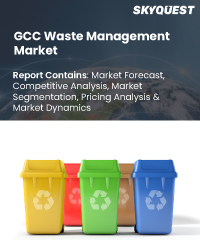
Report ID: SQMIR20N2029

Report ID:
SQMIR20N2029 |
Region:
Regional |
Published Date: February, 2024
Pages:
201
|
Tables:
123 |
Figures:
77
GCC Waste Management Market Drivers
Advancement in Waste Treatment to Bolster Market Growth
GCC Waste Management Market Restraints
High Cost to Hinder Market Growth
Our industry expert will work with you to provide you with customized data in a short amount of time.
REQUEST FREE CUSTOMIZATIONWant to customize this report? This report can be personalized according to your needs. Our analysts and industry experts will work directly with you to understand your requirements and provide you with customized data in a short amount of time. We offer $1000 worth of FREE customization at the time of purchase.

Report ID: SQMIR20N2029